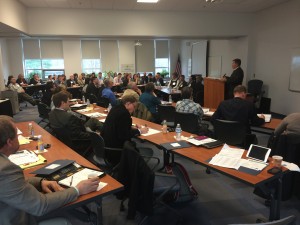By: Tristan Zuber, Extension Support Specialist, Harvest NY Program
Since taking this position at Cornell Cooperative Extension a year and a half ago, I am constantly discovering the struggle for food manufacturers in finding and accessing qualified employees from positions ranging from entry level to supervisor and management. There have been many efforts to alleviate this struggle, including development of a 2-week Food Processing Training Program by the Genesee County Economic Development Center, a new AAS Degree Program in Food Processing Technology by Genesee Community College, a Certificate program by Erie Community College and expansion of our Dairy Foods Extension Certification along with the courses that we offer. One concern is that industry may not be fully engaged into these programs, something that needs to happen for these program’s sustainability and success.
 On April 29th, Cornell Dairy Foods Extension and NY’s Workforce Development Agency – NYATEP (NY Association for Training and Employment Professionals) teamed up to host the first ever Food and Beverage Processing Workforce Development Summit at Finger Lakes Community College. Over 70 individuals from government, regulatory, industry, training and education programs attended the summit. Vinnie Esposito – Executive Director of Finger Lakes Economic State Development, attended to mention ways that NY was working to support the growing food processing sector. Casey McCue, Director of Milk Control at NYS Department of Agriculture and Markets gave an accurate portrayal of the growth in Dairy Foods Processing, while Chris Gerling – Senior Extension Associate – gave an overview of the growing Wine and Spirits sector and what this means in terms of employment.
On April 29th, Cornell Dairy Foods Extension and NY’s Workforce Development Agency – NYATEP (NY Association for Training and Employment Professionals) teamed up to host the first ever Food and Beverage Processing Workforce Development Summit at Finger Lakes Community College. Over 70 individuals from government, regulatory, industry, training and education programs attended the summit. Vinnie Esposito – Executive Director of Finger Lakes Economic State Development, attended to mention ways that NY was working to support the growing food processing sector. Casey McCue, Director of Milk Control at NYS Department of Agriculture and Markets gave an accurate portrayal of the growth in Dairy Foods Processing, while Chris Gerling – Senior Extension Associate – gave an overview of the growing Wine and Spirits sector and what this means in terms of employment.
Patrick Hooker – Deputy Secretary for Food and Agriculture – moderated a panel of industry and educational institution representatives. The employers discussed the s skills necessary to work at their companies, while the institutions gave an overview of their programs and challenges they face when recruiting individuals to their programs. One comment was, “this isn’t about cannibalizing each other’s work force, we’re in this together to grow the food processing ecosystem.”
The summit was then split out into four break-out groups to come up with tangible outcomes to further foster greater collaboration between industry, training and educational programs. This includes developing an alliance to enhance communication efforts, host more workforce development summits in the future and collect better data to further assess the needs of future employers. Melinda Mack, the Executive Director of NYATEP will be working further with us on further defining these tangible outcomes to create necessary changes that support workforce and economic development in food, beverage and dairy processing.

